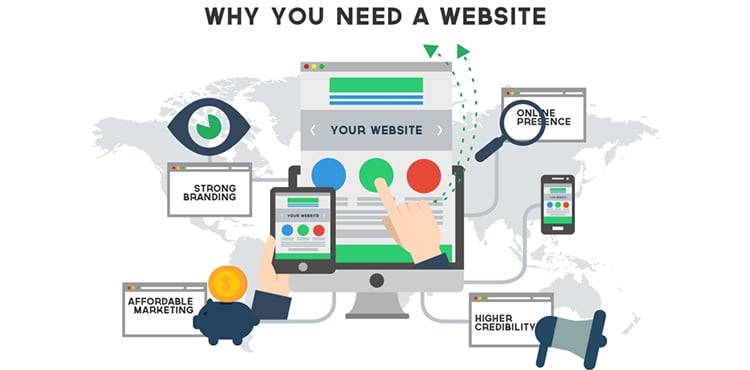The Imperative Need for a Website
- uptechadmin
- December 21, 2023
- website

why do we need a website?
In the era of digital dominance, the question is no longer whether you need a website but rather, how quickly can you establish a robust online presence. A website is not merely a digital luxury; it has become an indispensable tool for businesses, individuals, and organizations across the globe. In this comprehensive exploration, we unravel the myriad reasons why having a website is no longer an option but a necessity for anyone looking to thrive in the digital age.
1. Credibility and Professionalism:
In the digital age, your online presence is often the first point of contact between you and potential customers, clients, or collaborators. A professionally designed and well-maintained website adds credibility to your brand or persona. It is a testament to your commitment to staying relevant in the digital landscape and showcases your dedication to providing a seamless and trustworthy experience for your audience.
2. Customer Engagement and Interaction:
Engaging with your audience is no longer a one-way street. A website enables two-way communication, allowing you to interact with your customers or audience in real-time. Features such as contact forms, live chat, and social media integration facilitate direct communication, providing a platform for feedback, inquiries, and support. This level of engagement enhances the overall customer experience and fosters a sense of connection between your brand and your audience.
3. E-commerce Opportunities:
The rise of online shopping has revolutionized the way businesses operate. A website provides a gateway to the vast world of e-commerce, allowing you to sell products or services directly to consumers. Whether you are a small artisan crafting unique items or a large retailer with a diverse inventory, an e-commerce-enabled website opens up new revenue streams and expands your market reach.
4. Adaptability to Changing Trends:
The digital landscape is dynamic, with trends and technologies evolving rapidly. A website provides the flexibility to adapt to these changes seamlessly. Whether it’s incorporating new design elements, integrating emerging technologies, or adjusting your content strategy, a website allows you to stay ahead of the curve and remain relevant in a rapidly changing digital environment.

5. Global Visibility and Accessibility:
The internet has transformed the world into a global village, breaking down geographical barriers and connecting people from different corners of the globe. A website serves as your digital storefront, providing a platform for global visibility and accessibility. Whether you are a small local business or a multinational corporation, having a website allows you to reach a global audience 24/7, making your products, services, or information accessible to anyone with an internet connection.
6. Showcase Your Brand and Portfolio:
A website is the perfect canvas to showcase your brand, products, services, or portfolio. Unlike traditional advertising methods, a website allows you to present a comprehensive and dynamic representation of what you offer. From compelling visuals and engaging content to customer testimonials and case studies, your website becomes a powerful tool to influence and impress potential customers, clients, or employers.
7. Cost-Effective Marketing:
Traditional marketing methods often come with hefty price tags, making them less accessible for small businesses or individuals with limited budgets. A website levels the playing field, offering a cost-effective and scalable marketing platform. Through search engine optimization (SEO), content marketing, and social media integration, you can attract organic traffic and promote your brand without the need for extensive advertising budgets.
8. Data Analytics for Informed Decision-Making:
Understanding your audience is crucial for making informed business decisions. A website equipped with analytics tools provides valuable insights into user behavior, preferences, and interactions. By analyzing this data, you can refine your strategies, optimize your website for better performance, and tailor your offerings to meet the evolving needs of your audience.
9. Educational and Informational Hub:
Beyond promoting products or services, a website can serve as an educational and informational hub. Whether you’re a thought leader in your industry, an educator, or an organization with a mission to inform, a website provides a platform to share knowledge, resources, and insights. This not only positions you as an authority in your field but also contributes to the broader dissemination of valuable information.
10. Control Over Your Online Narrative:
In an age where information is abundant, having control over your online narrative is paramount. A website provides you with the autonomy to shape how you are perceived online. From the design and content to the overall user experience, every aspect of your website contributes to the narrative you present to the world. This control is particularly crucial in managing your reputation and building trust with your audience.
In conclusion, the need for a website transcends mere digital presence – it has become an essential tool for success in the modern world. From global visibility and credibility to customer engagement, marketing efficiency, and adaptability to changing trends, the benefits of having a website are multifaceted. Whether you are an entrepreneur, artist, professional, or organization, a website is the cornerstone of your digital identity. Embracing the digital landscape through a well-crafted and strategically designed website is not just a choice; it is a fundamental step toward unlocking the full potential of your online presence and ensuring your relevance in the dynamic and competitive digital age.

